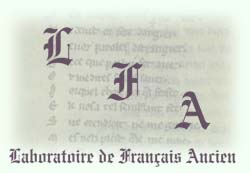

Browse the Complete Bibliography.
Please direct comments or queries about this service to ets@lib.uchicago.edu.
Orthographic Considerations:
There is no standard orthography in this database spanning some five
centuries. One can find, for
example, forms such as legacion, por, ystoire, etc. Wildcard
characters or Boolean operators can help detect such
inconsistencies.
Data-Entry Idiosyncrasies
Several data errors have been detected in some databases either from
typesetting errors in the original source or
from rekeying the documents. One should avoid making arguments from
silence. In particular, look out for the
transposition or doubling of letters.
Punctuation and Full-Text Searching:
Hyphens: Hyphens act as word separators. Thus, treat hyphenated
expressions as separate words excluding the hyphen (e.g., if searching
for Saint-Brandan, type in Saint Brandan).
Apostrophes: One must include apostrophes when searching words
with apostrophes and one must insert a space after apostrophes since
in
this database apostrophes act as word separators (e.g., only by typing
d' anne will one find D'Anne).
Ampersands: The ampersand (&) is not a searchable character. Avoid
Phrase Searches where an ampersand may be used as a conjunction.
| Please direct comments or queries about this service to ets@lib.uchicago.edu. |

|